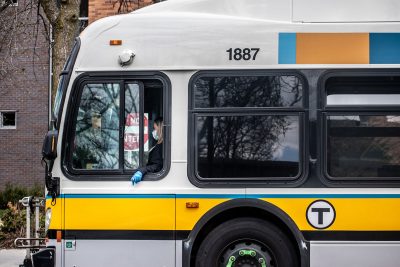The Massachusetts Bay Transportation Authority may eliminate weekend commuter rail service, ferry service and some bus routes to address COVID-19 budget challenges.

Ridership has fallen dramatically while the agency has maintained pre-pandemic schedules, according to an MBTA press release, making this level of service unsustainable.
MBTA General Manager Steve Poftak wrote in a letter to riders that the agency must adapt to the change in ridership and subsequent loss in revenue.
“Using limited resources to operate nearly empty trains, ferries and buses is not a responsible use of the funding provided by riders, communities, and taxpayers,” Poftak wrote, “and it does not help support the transportation needs of our region.”
The agency now provides an average of 330,000 trips on weekdays, which makes up about 26 percent of its ridership before the pandemic, according to Poftak’s letter.
All adjustments are expected to be temporary, the letter stated, and no fare changes are planned.
Kristiana Lachiusa, community engagement manager at transit advocacy organization LivableStreets Alliance, said the plan could neglect the needs of some commuters, especially those whose routes saw extremely low ridership.
“If you look just at the numbers, you might say, ‘Oh, there aren’t many people that are taking the commuter rail out to, let’s say, Wellesley,’” Lachiusa said. “But if you are a nanny or someone who cleans houses, you might rely on commuter rail or bus service to get out to these wealthy, white suburbs.”
Jim Aloisi, transportation policy and planning lecturer at the Massachusetts Institute of Technology, said he is surprised the MBTA has not conducted a formal equity analysis to determine if the plan will disproportionately harm vulnerable communities.
“There are serious equity issues because obviously, the people who are currently heavily using the T are folks who have to use the T,” Aloisi said.
Other major cities’ transit systems have dealt with similar budgetary challenges without enacting significant service cuts, Aloisi said.
“Chicago is not cutting service at all,” he said. “Last I heard, there’s a pandemic in Chicago just like there is one here.”
Although the MBTA has stated service adjustments would be temporary, Eric Bourassa, director of the Transportation Division at the Metropolitan Area Planning Council, said he is worried service cuts might ultimately have to continue for longer than planned.
“The biggest concern we have is that if things change over the course of the next year, how quickly can the MBTA bring that service back?” Bourassa said. “And if they’ve laid off a lot of staff, because that’s where the cost savings is, it will be hard to bring those people back.”
Bourassa added the MBTA should delay changes and wait for potential federal financial assistance.
Aloisi said the MBTA has “sufficient” funding through June 30, 2021, due to a federal relief bill passed earlier this year.
“We just elected a new president,” Aloisi said. “The idea that there won’t be additional federal aid coming is specious.”
Tatiana Fernandes, 23, of Brockton, commutes regularly on the Middleborough/Lakeville commuter line. She said the changes would inconvenience commuters who work on weekends.
“I am disappointed, but what can we do?” Fernandes said. “It’s still going to get changed, right?”
The Fiscal Management and Control Board, which will decide whether to implement the proposed service cuts, is scheduled to vote on Dec. 7, and will accept public feedback until Dec. 4.




























































































































